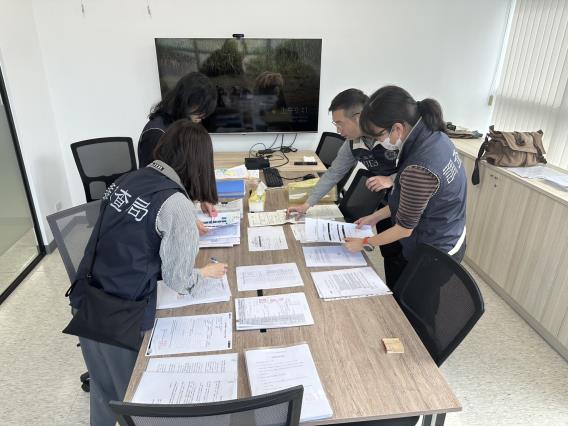
Taiwan’s high-tech industry is the backbone of our economy, with semiconductor companies and related industries serving as the country’s “National Protective Shield.” Consequently, Taiwan’s high-tech talent has become a key target for recruitment by Chinese enterprises. To prevent Chinese firms in Taiwan from illegal poaching and engaging in unauthorized business activities , the Ministry of Justice Investigation Bureau(MJIB) has established a special task force at the end of 2020 to investigate such cases. To date, more than 100 cases have been investigated. According to MJIB’s findings, Chinese enterprises often disguise their identities through various means, including setting up operations under the guise of Taiwanese, overseas Chinese, or foreign-invested companies, while in reality being backed by Chinese capital, establishing unauthorized business locations in Taiwan without government approval, and using employment agencies to falsely assign employees to Taiwanese firms.
To combat these illegal activities, MJIB launched a coordinated investigation starting in December 2024. Following extensive evidence collection, MJIB reported the findings to prosecutors in six jurisdictions—Taipei, New Taipei, Shilin, Taoyuan, Hsinchu, and Tainan—who then directed seven field divisions and offices of MJIB to simultaneously investigate 11 Chinese enterprises suspected of illegally recruiting Taiwanese high-tech talent. From March 18 to 27, 2025, more than 180 MJIB agents were mobilized to conduct searches at 34 locations and question 90 individuals. The investigations targeted the following companies:
The investigation uncovered illegal recruitment activities by several well-known Chinese enterprises in Taiwan, including:
1. SMIC is China’s largest semiconductor fab, ranking second in sales worldwide after TSMC and Samsung. The U.S. Department of Commerce placed SMIC on its Entity List for export controls on December 18, 2020. SMIC’s shareholders include China National Information and Communication Technologies Group Corporation, a central enterprise under the State-owned Assets Supervision and Administration Commission of the State Council, Xinxin (Hong Kong) Capital Co., Ltd., a wholly-owned subsidiary of the National Integrated Circuit Industry Investment Fund, National Integrated Circuit Industry Investment Fund Phase II Co., Ltd., China Construction Bank Corporation, Industrial and Commercial Bank of China Limited, and other heavyweight Chinese state-owned enterprises. The company's operations are controlled by Chinese nationals, with its Headquarters located in Shanghai, China. It operates three 8-inch wafer fabs and four 12-inch wafer fabs in Shanghai, Beijing, Tianjin, and Shenzhen. However, the company has reportedly used a Samoa-based entity as a cover to set up a subsidiary in Taiwan under the guise of foreign investment and has been actively recruiting talent from Taiwan.
2. Shenzhen Torey Microelectronics Technology Co., Ltd. specializes in the design and development of driver chips, and the company was listed as a “Specialized and Innovative Little Giant Enterprise” by China’s Ministry of Industry and Information Technology in 2023. The company never obtained legal approval to establish a branch or office in Taiwan. Instead, it secretly operated two offices in Tainan and Hsinchu, where Chinese headquarters staff conducted online interviews to recruit Taiwanese high-tech talent. Employee salaries were paid directly from China, and research outcomes in Taiwan were reported back to headquarters via Tencent’s online systems to evade detection by Taiwanese authorities.
3. Cloudnix (Shanghai) Technology Ltd. specializes in the development of high-end network chips and has aggressively recruited talent from major global firms such as Intel and Microsoft since its establishment in 2020. It has played a crucial role in advancing China’s “East Data West Computing” national strategy. Initially, the company registered in Taiwan under the false pretense of being a Taiwanese-invested enterprise. To circumvent regulatory scrutiny, it later altered its ownership structure to pose as a Singapore-based firm. Operational funds were transferred from Singapore to sustain illegal business activities in Taiwan, including the recruitment of Taiwanese chip design engineers.
(02)2911-2241
(02)2918-8888
(231209) 1F., No.74, Zhonghua Rd., Xindian Dist., New Taipei City